Romania Launches New Deposit Return Scheme To Boost Recycling
A new programme aiming to boost the recycling and collection of seven billion drink containers has kicked off in Romania.

This new deposit return system (DRS) seeks to promote separate collection and recycling of beverage containers by giving them a financial value and incentivising consumers to return them, according to media reports.
The move sees Romania joining 13 other European countries that have introduced a DRS system.
The DRS covers all single-use glass, plastic, and metal beverage containers from 0.1 to 3 litres, excluding milk.
Consumers pay a deposit of RON 0.50 (€0.10) per container, which is reimbursed when they return the empty container, featuring the RetuRO logo and a barcode, to a designated automated or manual return point.
The scheme aims to achieve a 77% collection rate by 2025 and 90% by 2029, driving a circular economy.
Norwegian beverage recycling company Tomra is providing reverse vending machines (RVMs) to retailers of all sizes in Romania to automate the return process and reduce labour costs.
This system maximises recycling rates, ensuring that used containers don’t end up in the landfill and are repurposed into new bottles and cans.
Related news
Local businessmen buy Carrefour’s Romanian chain
🎧 Hallgasd a cikket: Lejátszás Szünet Folytatás Leállítás Nyelv: Auto…
Read more >Related news
The Store of the Future opens again at the SIRHA Budapest exhibition! (Part 3)
🎧 Hallgasd a cikket: Lejátszás Szünet Folytatás Leállítás Nyelv: Auto…
Read more >New country director at the helm of JYSK Hungary
🎧 Hallgasd a cikket: Lejátszás Szünet Folytatás Leállítás Nyelv: Auto…
Read more >








